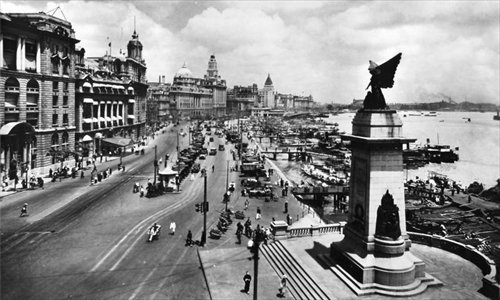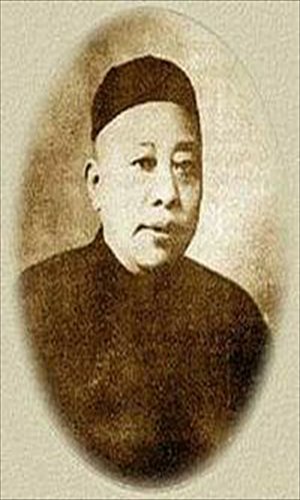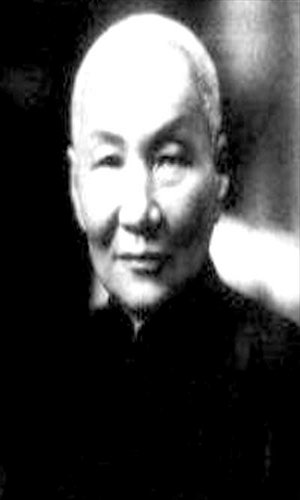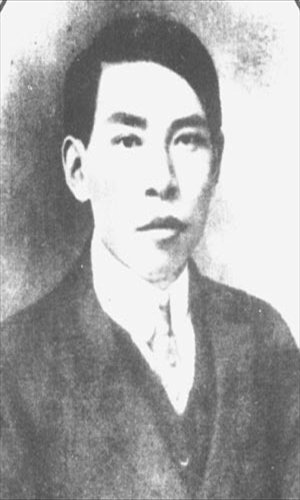Murder, mayhem and money

Du Yuesheng (1888-1951) remains a household name in Shanghai today, more than half a century after his death. Many regard him as the most powerful person in Shanghai of the 1930s and the most famous gangster of the old days. But Du was actually one of a trio of powerful gangsters. His rise to power could never have happened without the oldest of the trio - Huang Jinrong (1868-1953).
Huang, Du and Zhang Xiaolin (1877-1940) were known as the "three Shanghai tycoons." They founded the Sanxin Company which traded opium. At its peak, profits made by the company alone were equivalent to one third of the city government's total income.
They were the leaders of the Green Gang Triad, but they each had very different personalities: Huang was known for his drive for money; Zhang was a bad-tempered man who got into fights quickly; and Du was a charming affable man who made friends easily. Their lives were dramatic and dangerous - although two died in their later years Zhang was assassinated by a bodyguard.

An ordinary beginning
Huang Jinrong was born into an ordinary family in Suzhou, Jiangsu Province, but was lavished with love and care as the only son in the family. He moved to Shanghai with his family at the age of 5 and became an apprentice at a picture framing shop in 1884. But Huang was not keen on the business, preferring to spend his time in teahouses and theaters.
The City God Temple, as it is today, was then the busiest place in Shanghai. Huang had to go there to deliver framed pictures for the shop's clients. The story is that he used to see detectives ensconced on the second floor of a teahouse where they talked, or collected tips from their informants. And there were people who brought money to bribe the detectives to ignore cases.
His father used to be a detective in Suzhou but, apparently, he was not the person who inspired Huang who signed up with the Shanghai police and became a detective in 1890. Two years later he was recruited by the French Concession Police.
Huang, who was nicknamed "Pockmarked Huang," had little interest in paperwork but was good at befriending criminals and lowlife. With a large network of informants, thieves and forgers, he set about solving criminal cases. Sometimes he paid his informants to stage crimes for him so that he could "solve" them and add to his growing reputation in the force.
Huang actually did solve some major crimes and the case he was proudest of involved the kidnapping of a French Catholic priest. The priest had a close relationship with the then French consulate general in Shanghai and the French Concession Police. When he went to Tianjin to open a new church there, he caught a train from Shanghai but was grabbed en route in Shandong Province by the Chinese warlord Zhang Zongchang. Zhang held the priest under guard in a house in the countryside and sent out a ransom demand for a large sum of money.
All the French Concession police began searching for the priest, but no one had any clues or information. Then a reward was posted: anyone who provided information on the whereabouts of the priest would be given 3,000 yinyuan (or silver dollar) and anyone who assisted in the rescue of the hostage would get 10,000 yinyuan. In the 1930s, the monthly income for an ordinary worker in Shanghai was just 20 yinyuan.
Huang saw this as a good opportunity to showcase his talents and collect a fortune. He sent out his own informants to search for information but nothing worthwhile was immediately forthcoming. But then a minor theft in Shanghai proved a turning point. A man, Han Rongpu, had just reported that a pickpocket had stolen 100 yinyuan from him. Han was no ordinary citizen - he was the second in command to another Shandong warlord, Wu Peifu. Huang Jinrong saw the petty theft as a way towards a breakthrough so he gave Han 150 yinyuan and asked him to return to Shandong and make inquiries about where the priest could have been hidden.
He promised Han another 500 yinyuan if he received the information. Han did discover the location and Huang went personally to the isolated farmhouse in Shandong where, typically, he bribed the guards, offering them a large amount in cash and brought the priest back to Shanghai in triumph.
Huang was much praised for this coup and was made the highest-ranked Chinese detective in the French Concession Police.
Women of influence
Huang had married his first wife, Lin Guisheng, in Suzhou in 1900. She was a plain woman with short hair. But, although she wore no makeup and little jewelry, Lin made a big impression on Huang with her big expressive eyes. The plain woman was to become Huang's leading adviser and strategist and it was her who helped Huang amass his fortune.
Soon after they were married and settled down in Shanghai, Lin began to take charge of Huang's connections and the triad members. She used these resources to help Huang solve crimes while at the same time expanding his role in the triad. She had a sharp mind and was very determined.
Huang was involved in many business operations including theaters and bathhouses, but it was opium that brought him the most profits. He got into the opium trade on the advise of his wife. Lin suggested that they short circuit the trade by stealing opium from the wharves when it was being shipped in.
She organized a special gang who would snatch opium at the docks and sneak it into Huang's home by a back entrance. With most of his stock obtained for free, Huang and Du Yuesheng went on to launch the Sanxin Company which specialized in opium.
Huang Jinrong had a weakness for beautiful women and it was this weakness that nearly saw his downfall in 1924. Lu Lanchun was a glamorous star of opera in Shanghai and she was performing at one of Huang's theaters. She was more than 30 years younger than the detective and she was also being courted by Lu Xiaojia, a man in his early 20s.
She snubbed his advances and in return the young man attended her next performance and began booing and jeering. Huang Jinrong was in the audience that night and told his men to grab the young man and slap him. But Lu was the son of Lu Yongxiang, an Anhui clique warlord and the military governor of Zhejiang. That slap saw the detective being arrested shortly afterwards by the Shanghai Garrison Police. He was only released because of Du Yuesheng.
Despite the incident Huang decided to marry Lu Lanchun and he divorced the loyal adviser Lin Guisheng. But just one year after he married Lu, the opera star asked for a divorce. It was rumored that she walked out of the marital home taking a swag of money and jewelry with her, but the fortune was later seized and taken back.
When the Japanese arrived in town Huang Jinrong kept them at a distance. He died of illness at his home in 1953 at the age of 85.

Luck of a layabout
Zhang Xiaolin was born in a remote rural village in Cixi, Zhejiang Province. In his youth he was a layabout, frequently finding himself in fights. He went to the Zhejiang Military Academy in 1903 and befriended Zhang Zaiyang, who became the governor of Zhejiang in 1922. This connection gave him a key resource, which guaranteed him a place in the trio.
Zhang moved to Shanghai in 1912. Although he was one of the trio, he never made it to the top. At the beginning of their relationship, Huang was the leader followed by Zhang and Du. In the mid-1920s this changed to become Du, Huang and Zhang. Zhang had been a member of the triad society before Du and he felt he was the senior partner. He was unhappy when Du took the reins.
In 1937, the city was in turmoil with the Japanese army pressing hard. In October, Chiang Kai-shek, the leader of the Kuomintang, decided to leave Shanghai. To try to stop the gangster trio being used by the Japanese, Chiang invited them to move to Hong Kong.
Du agreed to go and Huang said he would remain in the city but promised not to do anything to assist the Japanese. However, Zhang saw it as his chance to take over the city.
By November that year, Zhang had agreed with the Japanese to help suppress anti-Japanese activities, arrest and kill loyalists, buy grain, cotton, coal and drugs for the Japanese army at low prices - or steal supplies for them. He took the opportunity to increase the numbers in his personal gang.
The Kuomintang was angered at Zhang's actions and decided to assassinate him. There were several failed attempts but then on August 14, 1940 one of his personal bodyguards, Lin Huaibu, fired a bullet into the gangster's head. Ironically, Zhang had been boasting about his new title as chairman of Zhejiang Province, a Japanese appointment.

A controversial figure
Du Yuesheng was the youngest of the gangster trio, but was famous for his generous and outgoing personality. He was very loyal to his friends, but was a controversial figure because of his involvement in the Shanghai massacre of 1927 and the War of Resistance against Japanese Aggression (1937-45).
Du was born in the countryside in today's Gaoqiao town in Pudong New Area. Both his parents had died when he was 4 and he began working in Shanghai helping on a fruit stall at Shiliupu Pier when he was 14. He met members of the Green Gang and joined the triad soon after.
A turning point in his life came when he was introduced by a friend to Huang Jinrong. Huang's wife Lin Guisheng saw potential of the young man after he had helped her quietly and efficiently in a few opium deals.
In 1925 he proposed the establishment of the Sanxin Company which went on to have a monopoly on the opium business in the French Concession. Du was then appointed President of the Associated Chamber of Commerce in the French Concession and Supervisor of the Association of Chinese Taxpayers.
When he began making big money he also began expanding his networks. Among his friends there were warlords, politicians, celebrities and business leaders. When his friends needed loans he was always ready to help them.
His rise to become the No.1 gangster in the city came after Huang Jinrong was arrested in 1924 by the Shanghai Garrison Police. Du had to use all his negotiating skills and a lot of money to get him released.
Huang stood down after his release, turning his criminal empire over to Du while he controlled things from behind the scenes. Du now controlled most of the city's gambling dens, prostitution and protection rackets, as well as a number of legitimate businesses.
But Du's role in the Shanghai massacre of 1927 left him tarnished. He had close ties with Chiang Kai-shek, who in turn had ties with both the Green Gang and other triads and secret societies. In 1927, Du lured Wang Shouhua, the chairman of the Shanghai Municipal Trade Union, to a dinner but had him strangled. The union's 800,000 members suddenly found themselves without a leader and in the clashes that followed thousands of workers were killed.
Chiang Kai-shek then appointed Du Yuesheng as an adviser and major general of the Military Commission of the Republic of China government.
However, during the War of Resistance against Japanese Aggression, Du served as the vice president of the China Red Cross Society and worked against the invading forces, rescuing injured Chinese soldiers, providing supplies and setting up small units to counter attack.
By 1946 Du's influence in Shanghai had extended to almost every sector. He was no longer a gangster but a successful businessman with up to 70 chairmanships or directorships on boards of companies involved in finance, traffic, culture, education and media.
Du fled to Hong Kong after the Kuomintang retreated to Taiwan in 1949 following their defeat in the Chinese Civil War. He died of illness in Hong Kong in 1951. In his later years he burnt all the papers recording money owed to him and, the once most powerful man in Shanghai, left only $100,000 to his family. Although his wish was to be buried in his hometown, he was buried in Taiwan.